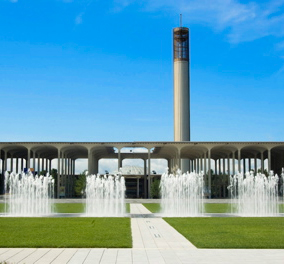 The Education Pipeline is always excited to update you on what is happening around the state from our exciting and meaningful initiatives. This week we would like to re-introduce you to the SUNY Works initiative, which brings students, SUNY schools, and local employers together to create on-the-job work experience for students. SUNY Works allows students to get experience in their chosen field of study, explore different aspects of the company they are working for, and in all co-op experiences and some internships, get paid!
The Education Pipeline is always excited to update you on what is happening around the state from our exciting and meaningful initiatives. This week we would like to re-introduce you to the SUNY Works initiative, which brings students, SUNY schools, and local employers together to create on-the-job work experience for students. SUNY Works allows students to get experience in their chosen field of study, explore different aspects of the company they are working for, and in all co-op experiences and some internships, get paid!
Last year was an exciting year for SUNY Works as nine pilot programs, launched in 2011, continued to strengthen the Co-op/internship experience by building partnerships with local businesses, expanding the offerings to students, and receiving additional funding from the Carnegie Foundation!
With the SUNY Works program growing all across New York State, you may be asking yourself, what exactly is SUNY Works? To answer that question, and fill you in on the basics, we’ve created a FAQ below that we hope will answer some questions.
Q: What is SUNY Works?
 A: SUNY Works is an educational model that integrates classroom learning and productive, structured, work experiences. Agreed-upon learning outcomes are directly linked to the goals and objectives of the participating students’ academic program.
A: SUNY Works is an educational model that integrates classroom learning and productive, structured, work experiences. Agreed-upon learning outcomes are directly linked to the goals and objectives of the participating students’ academic program.
The faculty members of our campuses offering the SUNY Works model work directly with business and industry partners to develop course curricula that is relevant to the needs of these partners in order to ensure that the participating co-op students are learning the academic content necessary for success in the workplace.
In turn, the business and industry partners work directly with the faculty members to develop workplace experiences that allow the students to apply what they are learning in the classroom to the real world. Working together, faculty and business partners develop learning outcomes, goals and objectives that are unique to their joint program, forming a true work-study experience for the student.
Q: So what is this co-op anyway? How is it different than an internship?
A: SUNY Works offers students two ways to gain experience: co-op and structured internships
Cooperative Education is a partnership between students, institutions of higher education, and employers that formally integrates a student’s academic program of study with work experience in cooperating employer organizations. Cooperative Education models can include alternating or combining, classroom study with paid, professional work experience. Co-ops allow students to integrate classroom theory with practical experience in industry and business by alternating semesters of paid employment in his or her major field with semesters of study.
A SUNY Works structured internship is a partnership between students, institutions of higher education, and employers that formally integrates a student’s academic program of study with work experience in a wide variety of settings. Internships can be credit or non-credit bearing, full-or-part time, on or off campus, paid or unpaid, and takes place within a specified duration of time.
Q: Why is this important?
A: Today, the majority of college students—as many as 70 to 80 percent—work while enrolled in classes. SUNY Works will provide those students the opportunity to address their need to pay the bills while in college with work experience that will make them employable following graduation. Seven out of every 10 co-op students are offered positions by the employers for which they worked while enrolled in the program. Increasingly employers are saying that the most important thing they look for when evaluating recent college graduates, more than their college, their major, or even their GPA.
Q: Ok, this seems cool! Where is the initiative right now, and what should I keep an eye out for?
A: In April of 2011, nine SUNY campuses launched cooperative education programs supported by a Lumina Foundation grant. These nine pilot campuses have been growing and developing SUNY Works, attracting students and employers in regions throughout New York State, 9 additional campuses will be launched this fall.
If you want to find out what the nine pilot programs are doing check out the links below
- Cayuga Community College
- Fashion Institute of Technology
- Fulton-Montgomery Community College
- Hudson Valley Community College
- Monroe Community College
- Onondaga Community College
- Schenectady County Community College
- Suffolk County Community College
- Stony Brook University
The SUNY Works program is funded in part thanks to the generous support of the Lumina Foundation and the Carnegie Corporation


